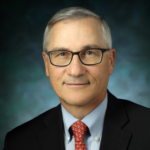Gerald L. Andriole, Jr., MD, presented “Prostate Micro-ultrasound” during the 42nd Annual Ralph E. Hopkins Urology Seminar on February 1, 2023, in Jackson Hole, Wyoming.
How to cite: Andriole, Jr., Gerald L. “Prostate Micro-ultrasound.” February 1, 2023. Accessed Nov 2025. https://grandroundsinurology.com/Prostate-Micro-ultrasound/
Prostate Micro-ultrasound – Summary
Gerald L. Andriole, Jr., MD, Director of Urology in the National Capital Region at the Brady Urologic Institute at Johns Hopkins University, discusses micro-ultrasound. He explains that novel micro-ultrasound operates at 29 MHz (much higher than conventional 6-9 MHz systems) and that it allows most prostate ducts to be visualized and tissue patterns appreciated. He explains the prostate risk identification using micro-ultrasound (PRI-MUS) risk identification protocol for systematically characterizing tissue, illustrating examples of various PRI-MUS levels. Dr. Andriole cites research that concludes practitioners become adept at interpreting micro-ultrasound lesions after about 30-40 scans. He presents a comparison of images from conventional ultrasound, micro-ultrasound, and multiparametric magnetic resonance imaging (mpMRI) that illustrates the superior imaging produced by micro-ultrasound. Dr. Andriole addresses transrectal and transperineal approaches, as well as MRI fusion biopsy using cognitive-assist fusion. He shows data validating PRI-MUS classification and research that concludes micro-ultrasound finds more cancer than conventional transrectal ultrasound (TRUS) systematic biopsy. Dr. Andriole also shares data that show that using systematic biopsy, micro-ultrasound targeted biopsy, and MRI together identifies the greatest proportion of clinically significant prostate cancer. He cites additional comparative studies of imaging types, and a recent study that examined micro-ultrasound results in men with negative MRI and found, of 125 patients with a negative MRI, 47 had cancer (and 33 of 34 who had clinically-significant disease were identified with micro-ultrasound). Dr. Andriole then reviews National Comprehensive Cancer Network (NCCN) guidelines that state “it is recommended that MRI should precede biopsy and image-guided biopsy techniques be employed routinely,” before describing the OPTIMUM trial. Dr. Andriole concludes that micro-ultrasound provides a fast, flexible, and accurate MRI-fusion experience with real-time visualization.
About The 42nd Annual Ralph E. Hopkins Urology Seminar:
The Ralph E. Hopkins Urology Seminar is a multi-day meeting focused on training urologists in the latest in assessing, diagnosing, and treating urologic conditions in the clinical setting. Updates are provided on urologic cancers, stone disease, urologic reconstruction, female urology, infertility, sexual function, emerging surgical techniques, and general urology. The 42nd iteration of the meeting took place from February 1st to 4th, 2023, in Jackson Hole, Wyoming.
For further educational activities from this conference, visit our collection page.
ABOUT THE AUTHOR
Gerald L. Andriole, Jr., MD, is the Chief Medical Officer of Prostatype Genomics AB in St. Louis, Missouri. Dr. Andriole is an internationally recognized key opinion leader in urology with a significant focus on prostate cancer. His research and clinical experience, much of which focuses on genomic testing, allows him to continue to positively impact the quality of care and outcomes for patients diagnosed with prostate cancer.

